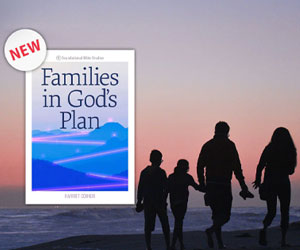
Let the little children be noisy
Should our church services be free of distractions, including kids? Mart Bartlett says no ... and offers some practical tips for your gathering.
A couple of Sundays ago, I was sitting in church struggling to listen to the sermon because of the level of noise coming from one of the little children in the congregation.
I sat there swinging from sympathy for the parents to frustration with them, wishing that they would take action sooner. As a parent of little ones myself (who was in their shoes literally only the week prior!) and as one of the children’s ministers at our church who insists that we keep toddlers in the service as much as we can, you'd think I'd have more patience for the situation! But the reality is that having kids in our church services is hard work and from time to time, quite distracting even for the most empathetic church members.
This doesn’t mean, however, that the answer is to take away the distraction. Church isn't meant to be easy and simple. In fact, a significant amount of the New Testament seems to be about how hard church is! The Bible never encourages us to exclude from church those who are distracting, but rather urges, even commands us, to love and welcome all kinds of people as equal members of the body of Christ and therefore our church gathering also (James 2:1-9).
So how do we welcome our youngest members in church while coping with the various frustrations that come as a result of their presence with us? In this two-part article, my aim is to share some thoughts from my church’s experience trying to do exactly this. In this post, I'll focus particularly on how churches can seek to welcome little ones and their parents, while in the next, I'll focus more on specific tips for mums and dads as they seek to parent within a church congregation and keep appropriate behavioural boundaries for their kids.
Firstly, tips for churches...
1. Equip those up the front
The people up the front set the tone of the gathering. This is especially true of the service leader. They are the ones whose job it is to help the rest of us to navigate through the service together, ensuring that we, as the people of God, are connecting with each other and our Lord. What they say and how they say it has ability to make people feel either affirmed as members of the gathered body or excluded from it. This is certainly true for people who have little kids with them.
For instance; the other week at church the person up the front had just finished their opening prayer: “Lord please take away any distractions that will keep us from focusing on you…” when all of a sudden the reverent silence was filled by my own son’s wailing for something he wanted but couldn’t have. What could I do but scoop him up and take him out of the service immediately? After all, according to the prayer, he (and therefore I) was keeping everyone from focusing on the Lord! Is this how the Lord would act upon such a prayer? After reading Matthew 19:13-15, I don’t think so.
On the other hand, I remember a service that I went to at St Andrew’s Cathedral in Sydney. I had some of my wider family with me at the time, who had a child who was likely to “lose it” before the service was over. They weren’t accustomed to a place like a Cathedral, so you can imagine the intimidation they must have felt as they sat there in such a grand place with a young ticking time-bomb on their hands! But when the Archbishop opened the service by warmly welcoming everyone, including the little kids, and acknowledged that even though they are likely to make a little noise throughout the long service, “that’s okay! We love that the little ones are here with us!”. This went such a long way in helping my family (and I imagine many others too) feel that they were actually welcome, and less like they were intruders in a sacred service likely to bring the whole thing to a grinding halt as soon as their kid got a bit rowdy.
The words that are said up the front have massive power to influence people’s participation in a church service. So churches who want to welcome little children and their parents will do well to equip their service leaders to think through the words they use and the impact that they will have for various members of the congregation.
2. Provide appropriate facilities
Another way to love little kids and their parents is to provide facilities for their use during the service. This will probably differ depending on your church— some churches are able to have a fully-functioning, gospel–centered program even for their youngest members, whereas other churches are unable to provide this at all.
At our church, we have a room available for parents to use as benefits them throughout the service. It has comfy chairs, toys and a video link to the service so they can still be connected with what's going on. It operates strictly under the supervision of parents/guardians, so it doesn’t need rostered helpers. It is not intended that parents and kids use the room for the whole service, rather its intended as a space for those times when it just isn’t working for the toddlers to be in the main hall. We haven’t been operating this way for very long, but so far we’ve found it to be a useful way of seeking to teach our young ones to be a part of the body, while also having another safe, comfortable space for them and their carers when things gets too much.
We also have “quiet toys” available for kids to use in the service however, we’ve learned a few lessons about these— firstly, what you think is a quiet toy isn’t necessarily so! Kids can be quite inventive in the way that they make noise with toys, so each toy is on a trial basis until it proves itself worthy of the title “quiet toy.” We've also found that we need to be careful when & how we distribute these toys— If we distribute them before the bigger kids go out to Kid’s Church (part way through the service) then they want a piece of the action too. Also, kids (and sometimes parents) can become possessive of their “favourite” toys, which can lead to trouble! So a regular rotation of toys is a good idea if possible.
On top of these things we've learned that if we encourage the kids to be in the same space with these toys (or even without the toys) then noise tends to escalate quickly, as kids are generally more interested in what other kids have than what they have themselves. So to avoid squabbles, it’s probably better not to have a designated ‘kids area’ within the service space.
3. Clear communication
Clear and thought-through methods of communication are a necessity in any potentially sensitive situation. Keeping children in church means that people’s parenting will be on display. Parenting style can be such a sensitive and loaded issue for so many people in our churches. For many, the pressure (whether real or imagined) to be a perfect parent with perfect children has become too much and they simply give up on church. But parenting will never be perfected by mere humans; and nor is it a one-size-fits-all kind of thing. We need to allow mums and dads to parent their own way. This is not to say that we should be okay with parents allowing their kids to run riot— that’s not going to help anyone! But nor should we force parents to adhere to a particular model of parenting in church.
In light of this, churches would do well to consider a) how we can encourage the congregation to be patient with parents as they figure out how to parent their kids in church; and b) how we can empower parents to parent actively in church. I believe that a key part of this is having a defined and open channel for communication, such as having a “go-to-person” for both parents and other church members to talk with when they are frustrated. Having an objective party such as this to help sort through frustrations with people while encouraging the fruit of the Spirit, will be a valuable thing.
4. Love despite the mess!
Here’s a fact— if we are going to welcome little kids as a part of our church gatherings, from time to time things are going to get messy and noisy. Like the rest of us, they are inclined to be self-focused and sinful. But the difference is that they lack the experience most of us have at keeping that side of ourselves more or less under wraps during a church service.
Often in church when things get messy, our inclination is to legislate—to form a committee who discusses how to clean up the mess, and then make a roster of people who can manage it from week to week to ensure that everyone is comfortable. This kind of legislation can be really helpful! But it sometimes misses the point. Church isn’t merely a group of people following a bunch of guidelines in order to keep things comfortable. Church is a group of messy, sinful people in relationship with each other through Christ. Although on the one hand we have been washed clean by the blood of Jesus, on the other hand we are still awaiting our Saviour to return and bring that sinless, mess-less reality to its complete fulfilment.
The answer for churches isn’t to sweep the mess under the carpet, but to love one another through the mess. This isn't really suprising, for that’s the example God sets for us (1 Jn 4:10); and that is what Jesus says signifies to others that we are his disciples (John 13:34-35). We need to foster a culture of selfless love— even within our church services!
Having kids with us in church provides the body with an opportunity to exercise such love towards them and their parents, while at the same time providing a safe context for parents to teach their children about loving those around them through their actions. Because after all, it’s not just about the church welcoming little children, it’s also about teaching the little children how to be loving, other-person-centred members of the body of Christ.
For more articles from Growing Faith, subscribe to our monthly e-newsletter.
To hear about the latest books and resources from Youthworks Media, subscribe here.







